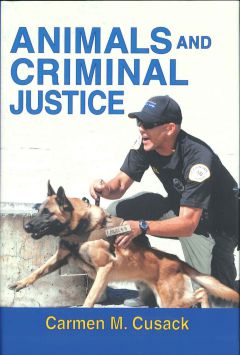Results
| Title | Citation | Alternate Citation | Agency Citation | Summary | Type |
|---|---|---|---|---|---|
| OK - Dog, therapy - § 2611.12. Support person or therapeutic dog | 12 Okl.St.Ann. § 2611.12 | OK ST T. 12 § 2611.12 | This Oklahoma statue was enacted by the state legislature to provide emotional support for a child witness, a child thirteen years of age or younger, in a criminal proceeding. The statute allows for a child witness to be accompanied by a support person while giving testimony. Additionally, the child witness is able to have a certified therapeutic dog accompanied by the handler in lieu of a support person. Under the statute, a certified therapeutic dog is a dog which has received requisite training and certification from the organizations listed in the statute. | Statute | |
| U.S. v. Molt | 631 F.2d 258 (3rd Cir. 1980) | 1980 U.S. App. LEXIS 13223; 10 ELR 20777 |
The court affirmed a judgment of sentence entered following defendant's conditional plea of guilty to smuggling and to violating the Lacey Act. The court held that the district court properly denied defendant's Speedy Trial Act motion where defendant incorrectly computed the number of excludable days. Therefore, the court concluded that more than 120 non-excludable days did not elapse between the indictment and the trial. |
Case | |
| United States v. Place | 462 US 696 (1983) |
This case addressed issues relating to searches and seizures and violations of Fourth Amendment rights. |
Case | ||
| DC - Cruelty - Consolidated Cruelty Statutes | DC CODE § 22-1001 - 1015 | DC ST § 22-1001 - 1015 | This D.C. statutory section comprises the anti-cruelty and animal fighting provisions. Whoever knowingly overdrives, overloads, drives when overloaded, overworks, tortures, torments, deprives of necessary sustenance, cruelly chains, cruelly beats or mutilates, any animal, or knowingly causes such acts, or one who unnecessarily fails to provide proper food, drink, air, light, space, veterinary care, shelter, or protection from the weather, faces imprisonment up to180 days, or a fine of $250, or both. Actions that result in serious bodily injury or death to the animal result in felony prosecution with imprisonment not exceeding 5 years or a fine of $25,000, or both. "Animal" is defined by statute as all living and sentient creatures (human beings excepted). This section also prohibits animal fighting as either a felony (i.e., wagering or conducting the fight) or a misdemeanor (knowingly being present). | Statute | |
| Futch v. State | 314 Ga.App. 294 (2012) | 2012 WL 603655 (2012) |
Defendant appealed conviction of cruelty to animals for shooting and killing a neighbor's dog. The Court of Appeals held that the restitution award of $3,000 was warranted even though the owner only paid $750 for the dog. The dog had been trained to hunt and retrieve, and an expert testified that such a dog had a fair market value between $3,000 and $5,000. |
Case | |
| Loman v. Freeman | 890 N.E.2d 446 (Ill., 2008) | 229 Ill.2d 104 (Ill., 2008) | This case concerns surgical procedures performed on a racehorse that rendered the horse unfit for future racing. The horse's owners brought this action against the veterinarians who performed the surgical procedure, alleging negligence and conversion. The circuit court dismissed and the court of appeals reversed the decision of the lower court. At the state supreme court, the court affirmed the judgment of the appellate court. The court found that defendant was permanently deprived of the use of the horse due to its lameness from the surgery, which sustained the claim of conversion. | Case | |
| US - Wolf - Endangered and Threatened Wildlife and Plants; Final Rule Designating | 2007 WL 408325 (F.R.) |
Establishes the Western Great Lakes Distinct Population Segment (DPS) of the gray wolf and removes the DPS from the list of endangered and threatened wildlife. |
Administrative | ||
| Animal Legal Defense Fund v. Reynolds | 8 F.4th 781 (8th Cir. 2021) | This appeal centers around an Iowa statute called the “Agricultural Production Facility Fraud" law that prohibited accessing agricultural production facilities by false pretenses and making false statements as part of an employment application to an agricultural production facility. Animal rights organizations filed a § 1983 action against state and county officials contending the law violated the the First Amendment free speech clause. The district court ruled that both provisions are unconstitutional and entered an injunction against enforcement of the entire statute. Here, the Eighth Circuit affirmed in part and reversed in part. The court found both the Access Provision and the Employment Provision constitute direct regulations of speech. However, the court held the conclude that the Access Provision's prohibition on assuming false pretenses to obtain access to an agricultural production facility is consistent with the First Amendment. In contrast, the Employment Provision did not survive strict scrutiny because is proscribes speech that is protected by the First Amendment and was not narrowly tailored. The court affirmed the district court's grant of summary judgment for the plaintiffs on Iowa Code § 717A.3A(1)(b), reversed the judgment declaring unconstitutional § 717A.3A(1)(a), vacated the injunction against enforcement of § 717A.3A(1)(a), (2), and (3), and remanded for further proceedings. | Case | ||
| Animals and Criminal Justice |
|
Policy | |||
| AL - Cruelty - Article 10. Bestiality | Ala. Code 1975 § 13A-6-220 - 221 | AL ST § 13A-6-220 - 221 | This Alabama section enacted in 2014 prohibits people from knowingly engaging in or submitting to any sexual conduct or sexual contact with an animal. The law also prohibits the furtherance of such activity or permitting any sexual conduct or sexual contact with an animal upon premises under his or her control. Violation is a Class A misdemeanor. | Statute |
